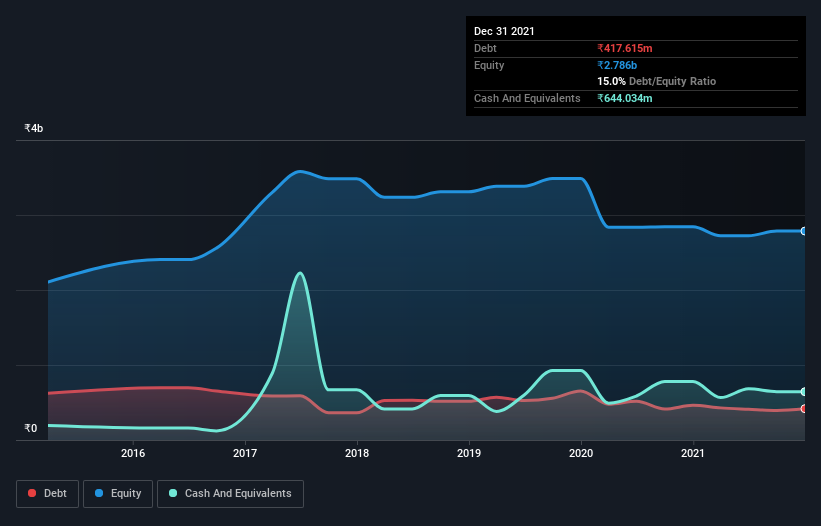- India
- /
- Consumer Services
- /
- NSEI:CLEDUCATE
CL Educate (NSE:CLEDUCATE) Has Debt But No Earnings; Should You Worry?
David Iben put it well when he said, 'Volatility is not a risk we care about. What we care about is avoiding the permanent loss of capital.' So it seems the smart money knows that debt - which is usually involved in bankruptcies - is a very important factor, when you assess how risky a company is. We note that CL Educate Limited (NSE:CLEDUCATE) does have debt on its balance sheet. But should shareholders be worried about its use of debt?
What Risk Does Debt Bring?
Debt assists a business until the business has trouble paying it off, either with new capital or with free cash flow. If things get really bad, the lenders can take control of the business. However, a more common (but still painful) scenario is that it has to raise new equity capital at a low price, thus permanently diluting shareholders. By replacing dilution, though, debt can be an extremely good tool for businesses that need capital to invest in growth at high rates of return. The first step when considering a company's debt levels is to consider its cash and debt together.
View our latest analysis for CL Educate
What Is CL Educate's Net Debt?
As you can see below, CL Educate had ₹417.6m of debt at September 2021, down from ₹462.7m a year prior. However, it does have ₹644.0m in cash offsetting this, leading to net cash of ₹226.4m.

How Strong Is CL Educate's Balance Sheet?
Zooming in on the latest balance sheet data, we can see that CL Educate had liabilities of ₹963.4m due within 12 months and liabilities of ₹126.7m due beyond that. On the other hand, it had cash of ₹644.0m and ₹722.5m worth of receivables due within a year. So it actually has ₹276.4m more liquid assets than total liabilities.
This surplus suggests that CL Educate has a conservative balance sheet, and could probably eliminate its debt without much difficulty. Succinctly put, CL Educate boasts net cash, so it's fair to say it does not have a heavy debt load! There's no doubt that we learn most about debt from the balance sheet. But you can't view debt in total isolation; since CL Educate will need earnings to service that debt. So when considering debt, it's definitely worth looking at the earnings trend. Click here for an interactive snapshot.
In the last year CL Educate wasn't profitable at an EBIT level, but managed to grow its revenue by 4.2%, to ₹2.0b. That rate of growth is a bit slow for our taste, but it takes all types to make a world.
So How Risky Is CL Educate?
Although CL Educate had an earnings before interest and tax (EBIT) loss over the last twelve months, it generated positive free cash flow of ₹18m. So taking that on face value, and considering the net cash situation, we don't think that the stock is too risky in the near term. With mediocre revenue growth in the last year, we're don't find the investment opportunity particularly compelling. There's no doubt that we learn most about debt from the balance sheet. However, not all investment risk resides within the balance sheet - far from it. To that end, you should learn about the 2 warning signs we've spotted with CL Educate (including 1 which can't be ignored) .
At the end of the day, it's often better to focus on companies that are free from net debt. You can access our special list of such companies (all with a track record of profit growth). It's free.
New: AI Stock Screener & Alerts
Our new AI Stock Screener scans the market every day to uncover opportunities.
• Dividend Powerhouses (3%+ Yield)
• Undervalued Small Caps with Insider Buying
• High growth Tech and AI Companies
Or build your own from over 50 metrics.
Have feedback on this article? Concerned about the content? Get in touch with us directly. Alternatively, email editorial-team (at) simplywallst.com.
This article by Simply Wall St is general in nature. We provide commentary based on historical data and analyst forecasts only using an unbiased methodology and our articles are not intended to be financial advice. It does not constitute a recommendation to buy or sell any stock, and does not take account of your objectives, or your financial situation. We aim to bring you long-term focused analysis driven by fundamental data. Note that our analysis may not factor in the latest price-sensitive company announcements or qualitative material. Simply Wall St has no position in any stocks mentioned.
About NSEI:CLEDUCATE
CL Educate
Provides education and test preparation training programmes in India and internationally.
Good value with adequate balance sheet.
Similar Companies
Market Insights
Weekly Picks


Crazy Undervalued 42 Baggers Silver Play (Active & Running Mine)


Fiducian: Compliance Clouds or Value Opportunity?

Willamette Valley Vineyards (WVVI): Not-So-Great Value
Recently Updated Narratives


Positioned globally, partnered locally


When will fraudsters be investigated in depth. Fraud was ongoing in France too.


Staggered by dilution; positions for growth
Popular Narratives


MicroVision will explode future revenue by 380.37% with a vision towards success


NVDA: Expanding AI Demand Will Drive Major Data Center Investments Through 2026





